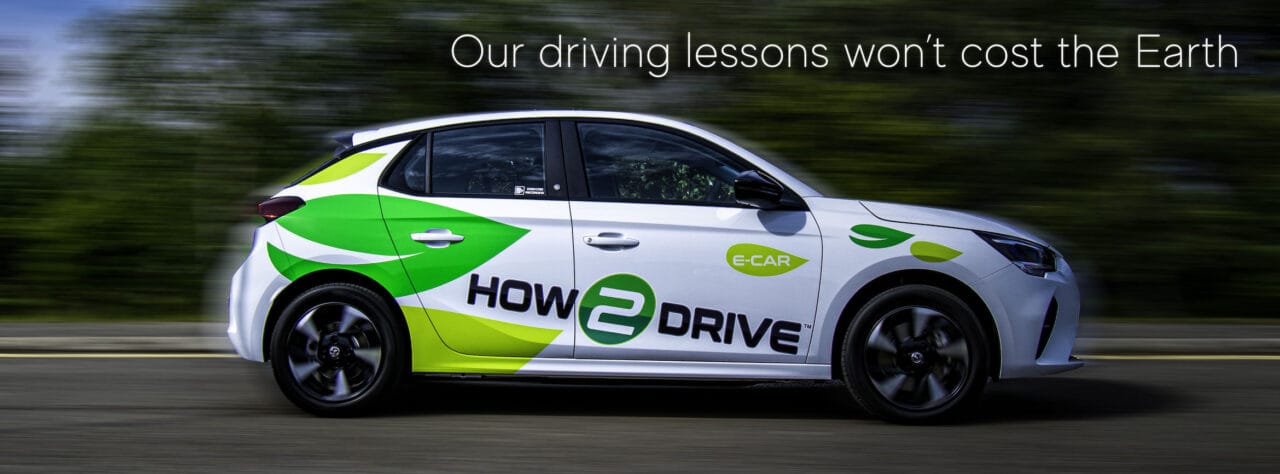We are proud to announce that we are the first driving school in Norwich to offer electric vehicle driver training. This makes us one of a growing number of electric car driving schools in the UK!
As of August 2020 you can now learn to drive in an electric car in the Norwich area. Our fully-qualified driving instructor Blair Wilson took possession of his brand new Vauxhall Corsa-e in July 2020.
Electric vehicles (EVs) are growing in popularity as consumers demand more environmentally friendly and economical vehicles. EV sales have seen a steep growth since 2014 and this trend will continue as we move closer to the UK Government’s impending ban on the sales of new petrol and diesel cars in 2035. As a result of this change in the law, now is the perfect time for learner drivers to consider taking driving lessons in electric cars.
To explain more about electric vehicles and what it will be like to take driving lessons in this new class of car we interview Howard Floyd, founder of How-2-Drive Driving School.
What is an electric vehicle?
An electric vehicle is a car powered solely by an electric motor. They have a battery which is charged up by a standard domestic electricity supply. The great news for the environment is that they do not need traditional fossil fuels such as petrol or diesel. Considering the eye-watering cost of refilling at a petrol station these days, EVs are also very economical to run.
For clarity, electric cars are not to be confused with hybrid vehicles. These use both a traditional combustion engine and an electric motor. A hybrid electric vehicle cannot be plugged in to charge the battery. Instead, the battery is charged through regenerative braking and by the internal combustion engine.
How is driving an electric car different?
The main difference is the way in which the power from the engine is transmitted. EVs are able to accelerate without any interruption of power to the drive wheels. This makes for a very smooth ride and a responsive feel. Better yet, it’s impossible to stall an electric vehicle – even beginner pupils can expect smooth acceleration as they pull away.
Slowing down is also easier and exerts less wear on the car. By lifting off the accelerator pedal the vehicle slows very responsively so there is less need to press the brake pedal.
Finally, there’s no noisy combustion engine in an EV so it’s very quiet inside the cabin. This makes it easier to hear the instructor which helps reduce pupil anxiety whilst learning to drive.
Besides acceleration and braking, all the other driving skills remain the same. At our driving school, students will still learn the same core driving skills: awareness, anticipation, planning and judgement. Regardless of vehicle, these skills are essential as they give drivers the tools they need to effectively deal with all types of road and traffic conditions.
Do electric cars have gears?
Electric vehicles only have one gear so there is no need for a clutch. In the cockpit, EVs appear to be the same as automatic cars since both types of car have no clutch – but automatics do still have gears!
In a traditional automatic, light acceleration can feel un-responsive whilst heavy acceleration leads to a gear down shift. The sudden boost in power that arises from changing down a gear makes it more difficult to control the vehicle. In an EV, however, the single gear means acceleration is consistent making for a smooth drive.
Traditional cars with gears suffer from interrupted power flow as a result of gear changes. This can give a bumpy drive – especially when learning! We all know that manual cars have gears but many of our students don’t realise that automatics have gears too!
What are the downsides to taking electric car driving lessons?
Most would agree that learning to drive in an electric car is easier than than a manual or even automatic car. However, passing your test in an EV will only entitle you to drive automatic vehicles as there is no clutch. This means that people who pass the UK driving test in an electric car will not be permitted to drive a car with manual transmission.

Electric vehicles are still more expensive to purchase than traditional cars. For this reason you are unlikely to have one as your first car. Whilst EVs are the easiest to drive, they are still similar enough to automatic petrol and diesel cars that your skills will be transferable. Taking lessons in an electric car or even a traditional automatic car is definitely a great option if you are keen to pass as soon as possible.
Despite EVs being more expensive to buy, we’re not passing on any of this additional cost on to our students. We want to encourage more people to try this new technology and help reduce carbon emissions so we’re still only charging our standard rate for automatic driving lessons.
Can you drive an EV on an automatic licence?
Yes, absolutely! Because electric cars have no gears they offer a very similar driving experience to old-fashioned automatic cars. If you have a manual licence, then you can drive all three types of car.
Can you take your driving test in an electric car?
You can! But do remember that if you pass your driving test in an EV then you will only be able to drive electric vehicles and automatic cars. This is becoming less of an issue these days as petrol, diesel and hybrid cars will be outlawed in 2035 in the UK. Manual transmission will become more or less redundant after this point.
Do you need a licence for an electric car?
You do still need a full driving licence to drive most electric cars. However, there is a special class of electric car that falls into driving licence category AM. You do not need a full driving licence to drive vehicles in this category.
The Renault Twizy and the Citröen Ami both fall into this category and are technically categorised as ‘light quad bikes’. So long as you have passed your moped Compulsory Basic Training and you are 16 years of age then you can drive one of these two cars on British roads! Don’t get too excited though – by law these vehicles must have a maximum speed of 28mph!
Is it cheaper to own an electric car?
If we’re talking about the total cost of ownership, then yes it is cheaper to own an electric car. At the moment, electric vehicles are more expensive to buy than their fossil fuel equivalents. However, when you factor in the cost of fuel and maintenance EVs work out cheaper in the long run.
Do you really save money with electric cars?
In terms of fuelling, electric cars cost around 3 pence per mile to run. This is less than half the cost of
petrol cars which work out around 8 pence per mile.
Maintenance is also another significant cost to consider. Because EVs have improved de-acceleration, the brakes are used less which means they last much longer! One of the first UK driving instructors to go electric claimed his brakes had so far lasted for 126,000 miles and were still only half worn!
With fewer moving parts EV’s are typically 30% cheaper to maintain than petrol or diesel cars. This makes perfect sense when you realise there is no need for engine oil and filters, spark plugs, starter motors, radiators, complex transmission systems or exhausts.
With an electric vehicle you only need to maintain the motor, brakes, tyres and suspension! The only thing to remember is that the batteries do not last forever: you should expect to replace it about every 8 years.
How far can EVs drive before needing a recharge?
With the newest generation of EV’s you can expect to get between 200 and 300 miles per charge. This range will depend on your average speed, outside temperature and whether you’re using climate control. Most new electric cars can rapidly recharge the battery up to 80% of capacity within 30 minutes, which should be enough to quickly get you out of a tight spot.
As the technology develops and more people adopt EVs we can expect to see the range increase whilst prices continue to come down.
How easy is it to find a charging station?
There is an ever increasing number of places where you can recharge your EV. Norwich City Council offer free charging at Rose Lane multi-storey and the UEA Enterprise Centre carparks. You can also charge up whilst you do your shopping with shopping centres such as Chapelfield and Castle Quarter (formerly Castle Mall) offering rapid charge terminals in the city centre.
Conclusion
You might not have considered learning to drive in an electric car before. Whilst you probably won’t buy an EV as your first car, having experience with the next generation of vehicle will put you in a good position once the Government bans traditional vehicles in 15 years’ time.
During this time, expect the technology to improve immensely – EVs will become cheaper to buy, easier to recharge and their range will increase to meet or exceed that of a traditional car.
Book your half-price introductory driving lesson today and you’ll have a chance to become one of our first EV pupils!
